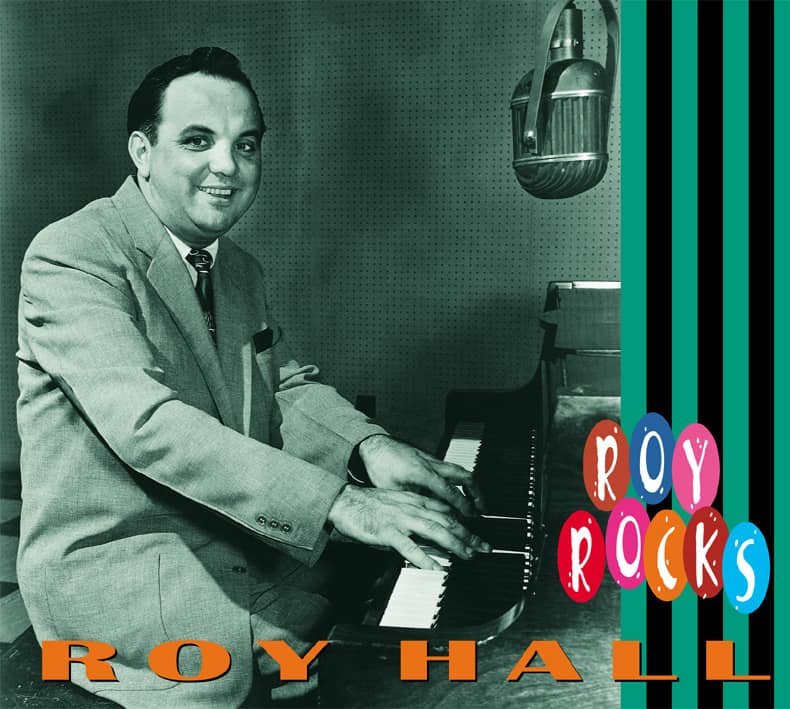Who was/is Roy Hall ? - CDs, Vinyl LPs, DVD and more
Roy Hall
 Hall, Roy There are two versions of the Roy Hall story. There is the one that plays up the legend about the wild two-fisted, blues-influenced piano-pounder with the tall stories, who took another man's name, wrote one of the anthems of rock 'n' roll, stayed drunk a lot, conned every man, woman and child he came into contact with, and who recorded some of the rawest music ever to come out of the piano cracks between blues, boogie, and honky tonk music.
Hall, Roy There are two versions of the Roy Hall story. There is the one that plays up the legend about the wild two-fisted, blues-influenced piano-pounder with the tall stories, who took another man's name, wrote one of the anthems of rock 'n' roll, stayed drunk a lot, conned every man, woman and child he came into contact with, and who recorded some of the rawest music ever to come out of the piano cracks between blues, boogie, and honky tonk music.
And then there is the other story of Roy Hall. The country boy from the Appalachians who did indeed play a mean piano, did indeed write at least part of a famous song, did indeed pull a few alcohol-fuelled scams in his time, but who essentially was a country musician who spent most of his time as a back-up player and road manager, show promoter, night club owner, newspaper proprietor, and general hustler.
I'm going to tell you about the real Roy Hall, the man I first met one Sunday in 1974. He was in his office, wearing red trousers and a young blonde on his arm. He was hustling, talking on three phones at once, and telling me his life story. That story is interesting enough, and confusing enough, without any embellishments. And along the way he did happen to record a CD’s worth of classic rock 'n' roll.
Roy Hall was not actually 'Roy' Hall at all: his given name was James Faye Hall when he was born on May 7, 1922 in Virginia. He came from Big Stone Gap, a town smaller than it sounds, some twenty miles from Bristol. "That's the town that straddles the Tennessee state line," he told me. "I was born on the Virginia side."
Although writer Nick Tosches later promoted the legend that Roy learned piano from "an old coloured man" who taught him the blues, the boogie, and how to drink, Hall had actually given me a much more prosaic version when I first met him in 1974 and again in 1975. "Back there in Big Stone Gap, Virginia was where I learned music. I started to play piano through my mother's influence. She was the one that started me with that, playing hymns and old tunes. She got me some piano lessons too, but I play by ear. I just can hear it and follow it. I had two lessons from a professional teacher, but I gave it up because I was better at learning by ear. I could just listen to a tune, see, and play it right off. I could already hear what I wanted to know."
Hall made no mention to me of learning his piano style from bluesmen, though he did talk about Piano Red, and in fact he emphasised his roots in folk and hillbilly music. "When I started to play, we would work at all the little country dances and school halls and social events in little no-account hillbilly towns. We played music for dancing mostly. I learned the piano first but I also learned to play the accordion 'cos that was what was used in a lot of folk music at that time, and it was easier to carry round than a piano! Later on, when I got into the honky tonks and joints and all, then there was always a piano and I went back to that as my main instrument."
The first important thing that happened to James Faye Hall in music was when he was hired to back up a travelling WSM radio 'Grand Ole Opry' show featuring the legendary pre-War star of pre-country music, Uncle Dave Macon. Roy told me, "I started playing piano professionally as a sideman with Uncle Dave Macon, from the Grand Ole Opry. I was eleven years old."
The next significant thing was that James Faye became 'Roy' sometime around 1945 or 1946. "About then," he told me, "I worked some around Roanoke, Virginia with some other boys, and we were the Hall Brothers. That was my first professional band really." He didn't specifically say so, but the brothers were probably banjoist Clayton Hall and his brother Saford, who played fiddle. The brothers had formerly worked with their older brother, Roy, as part of Roy Hall's Blue Ridge Entertainers, firstly out of South Carolina and latterly in and around the Virginias. They had recorded on Vocalion and Bluebird in the late 1930s and early 1940s. When guitarist Roy Hall died in an auto wreck in 1943, his brothers continued playing with a number of other musicians including, it seems, James Faye Hall.
Roy Hall Roy Hall - Roy Rocks
Read more at: https://www.bear-family.com/hall-roy-roy-hall-roy-rocks.html
Copyright © Bear Family Records
Copyright © Bear Family Records®. Copying, also of extracts, or any other form of reproduction, including the adaptation into electronic data bases and copying onto any data mediums, in English or in any other language is permissible only and exclusively with the written consent of Bear Family Records® GmbH.

Item has to be restocked

This article is deleted and can no longer be ordered!

Item has to be restocked

Item has to be restocked
